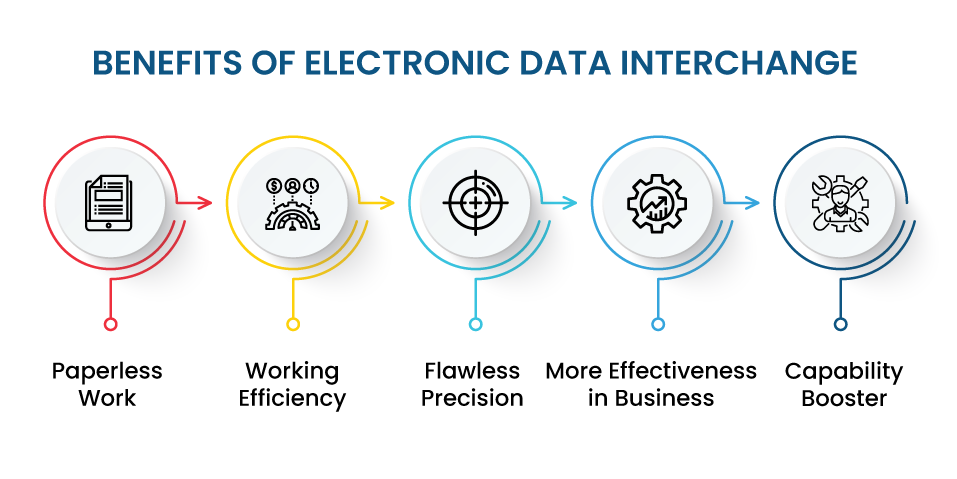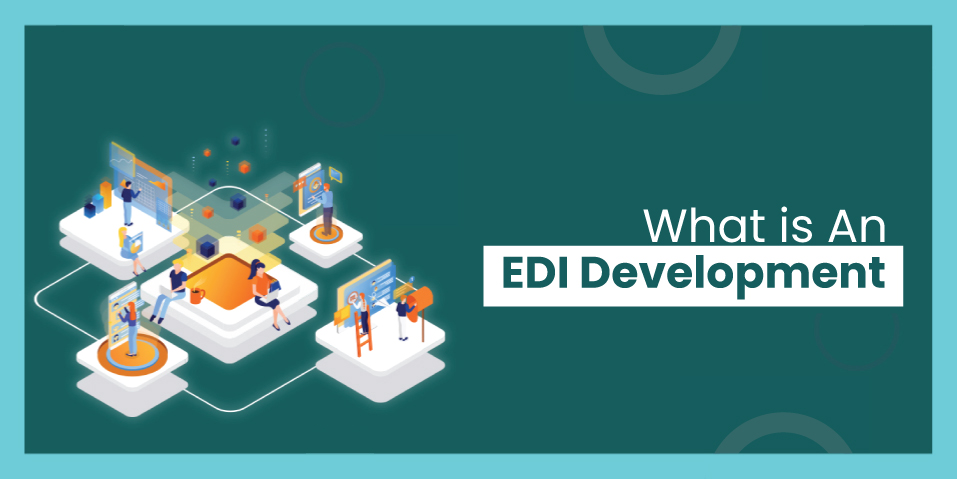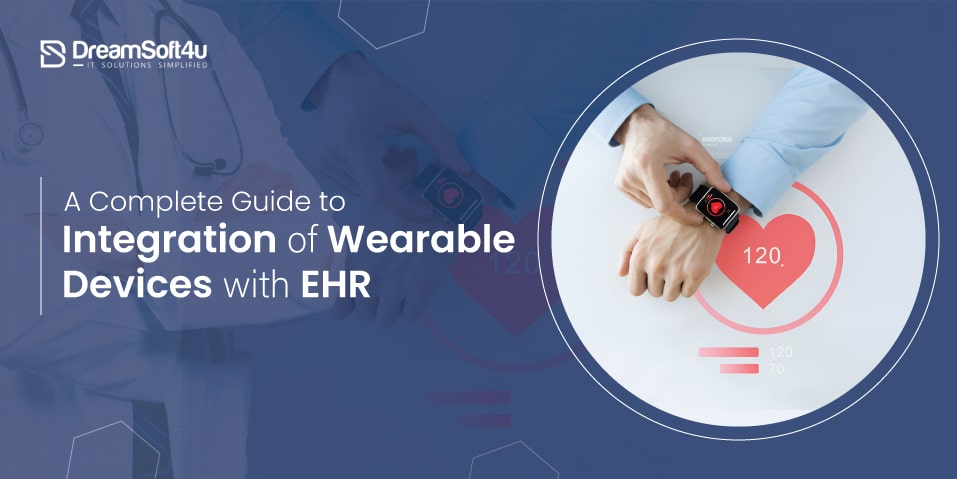What is an EDI Development? Electronic Data Interchange (EDI) is a popular concept among businesses. It offers a smooth transfer of information electronically among businesses avoiding documents and paperwork. By implementing EDI Software, the organization can avoid or eliminate expensive errors in the manual transfer or sharing of information. It also saves time which is again valuable in order decision-making.
Currently, EDI software is highly adopted by companies to share or receive confidential or non-confidential information frequently. In almost all scenarios, these companies are B2B businesses that are frequently interchanging goods and services.
Table of Contents
ToggleHow Does EDI Software Works?
Electronic data interchange in the healthcare sector mainly works like transcribing information from one computer application in a company to another computer application. The software ensures the geographic region and order of information in a documented format. With the automation it serves, companies get instant reporting or sharing of information. Below we have described the actual process of How the EDI System Works?
In a general sense, EDI transactions are explained through EDI message standards. Simultaneously, the government must ensure data quality. If any information is missing or not obtained by the system, EDI documentation might not work correctly.
What Are The Two Basic EDI Transmissions?
EDI conversations are supposed to be held to some well-organized standards. Many companies follow EDI message standards like GS1, ODETTE, Peppol, TRADACOMS, and the Accredited Standards Committee X12 (ASC X12).
Two Types of Transmission:
- Point-to-Point or Direct Connections: When two computers connect directly without any middleman on the internet.
- Value-Added Network: A third-party network that takes care of data transfers. Think of it like a mailbox system where they manage the messages.
Electronic Data Transfer (EDI) happens using methods like Secure File Transfer (SFTP), AS2, HTTP-based protocols, and SOAP. This system also uses Sender and Receiver IDs, and data segments combine multiple elements to understand information better.
What Are The Benefits Of Electronic Data Interchange (EDI)?
The system has become the pioneer tool in the field of B2B business. Simultaneously, it has continued to be the top-notch service for interchanging data electronically from company to company. Seeing the demand and utilization, the researchers have found several benefits of the EDI system. Among these, the most result-driving advantages are stated below:
You May Also Like:

1. Paperless Work:
In the green theme, Electronic Data Interchange has produced paperless working. It has also incorporated a seamless transfer of files or information from computer to computer. The system has almost reduced the paperwork and documentation. By this, manual faults and heavy losses have been recovered. Moreover, it has provided the following facilities:
- Printing
- Reproduction
- Storage
- Filling
- Postage
- Document Retrieval
- Complaint Handling
All these miscellaneous expenses have been cut down or reduced to “zero.” A more predictable, controllable format and automation in working have obtained effectiveness in ordering, delivery, and invoicing. It has also reduced the staff ratio as everything is now automated.
2. Working Efficiency:
As EDI software has boosted automation in each step, hands-free ordering has been induced, which has cut down order-to-shipment in just half timing. In addition, the EDI system has eliminated the paper-based manual entry mechanism, which also saves time and money. Following are the additional benefits it gives with high-speed performance:
- Data sharing has become simple
- Seamless real-time communication
- Real-time transactions in seconds
- Order-to-cash & Purchase-to-pay cycle has been accelerated
- More stability for businesses
- Customers get more trading discounts than ever.
3. Flawless Precision:
Earlier the paper-based entries in the ERP system were more prone to errors. Electronic data interchange has made any exchange of information possible without errors. It integrates very with the ERP system and minimizes the following expectations:
- Chargebacks
- Delayed Shipments
- Incorrect Product Costs, etc.
Moreover, the increase in client and employee satisfaction is the direct outcome of EDI software. The best example of precision here is exchanging Advanced Shipping Notices (ASNs) serving smooth supply chains. An ASN stands for the digital documents needed to ascertain pending delivery. ASN serves as the best explanation of EDI.
4. More Effectiveness in Business:
Automation through EDI Software ensures timely delivery of shipments across B2B businesses. The seamless process improves the entire demand and supply chain, which is tracked in real-time. The high-end reach makes measurements and robust management of significant business KPIs.
Optimization of inventories is done through EDI SCM, which lessens the order processing and distribution times, automatically improving inventory levels. Moreover, it follows the following business ethics:
- The higher percentage of orders maintains less inventory
- EDI records all transactions
- Better performance of supply chains
5. Capability Booster:
In many scenarios, experts believe that business development is the most brilliant EDI benefit. An EDI compliance with small or big trading partners & retailers brings the ability to connect with retailers. Majorly in the automotive & logistics industry, there is a real chance of surviving without EDI. The following are the other significant advantages:
- Enhances the ability to connect with new trading partners
- EDI is available for all business segments, i.e., small or large scale
- It allows seamless transactions between small & large-scale partner
- EDI also solves the technical and business connection requirements.
What Does An EDI Developer Do?
An electronic data interchange developer is an EDI software specialist. The person holds a significant amount of responsibility to make EDI work flawlessly. The EDI developer: performs many necessary tasks
- EDI developer troubleshoots FTP networking
- The ability to transfer files effectively is done by EDI developers.
- A developer takes care of SQL reports
- EDI software developers are in charge of developing, testing and implementing EDI
- The developer ensures the correlation between the data, which is known as mapping.
- EDI system developers also maintain EDI documents.
- He also ensures the system works effortlessly.
- Processing each document or information should be as easy as possible.
- EDI developers provide high-end security to the files transferred.
There are many other duties of an EDI developer. But for now, the crucial ones are stated above. To maintain the mechanism and its efficiency, an EDI developer is a much-needed person.
Looking for an end-to-end software solution for your business?
Get in touch with our team of certified developers for a cost-effective solution
Final Words
So, this was all the details of EDI Development and its benefits. Simultaneously, our team has described the utility of EDI developers in an organization. If you have any queries related to EDI development, read more on dreamsoft4u.com.
FAQs
Q1. What industries commonly use EDI development?
EDI development is commonly used in industries such as retail, healthcare, automotive, and logistics, where the exchange of electronic documents between businesses and their trading partners is crucial.
Q2. What are some common EDI document types?
Common EDI document types include purchase orders, invoices, shipping notices, and payment advice.
Q3. How can I get started with EDI development?
To get started research available EDI solutions. Identify the types that best match your needs and requirements, and work with a trusted technology partner to develop and implement their EDI system.
Q4. What skills are required for an EDI developer?
The skills required for an EDI developer include knowledge of EDI standards, communication protocols, data mapping, and programming languages such as Java or C++.
Q5. What programming language is EDI?
EDI is not a programming language, but rather a set of standards for exchanging business documents electronically. However, programming languages such as Java or C++ are often used to implement EDI solutions.
Q6. What is EDI vs API?
EDI and API are two different methods of exchanging data between different computer systems. EDI is a standard for exchanging structured data between trading partners, while API is a set of protocols and tools for building software applications.
Q7. Is EDI hardware or software?
EDI is a software technology that enables the electronic exchange of business documents between trading partners. While EDI can be implemented on hardware such as servers or routers, it is primarily a software solution.










